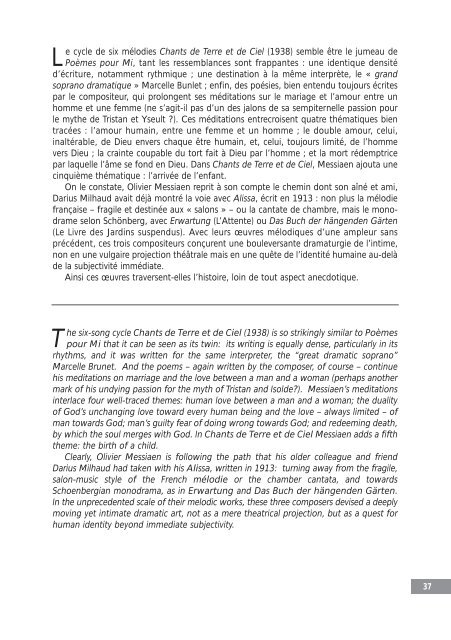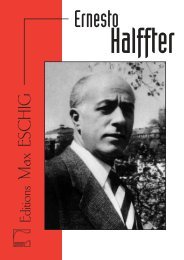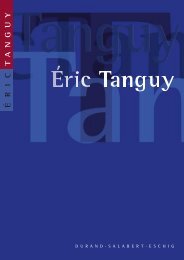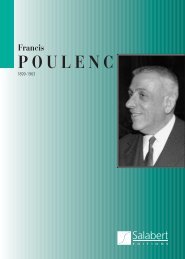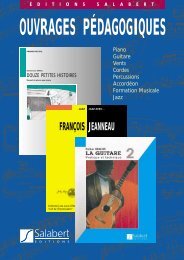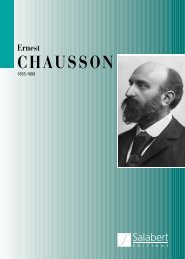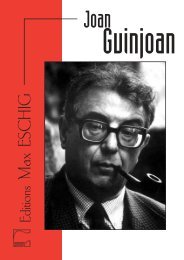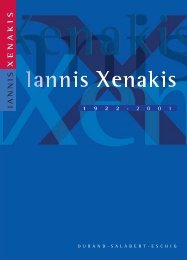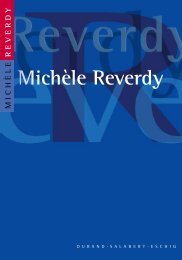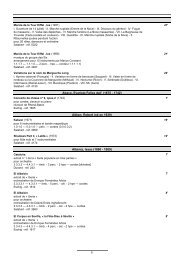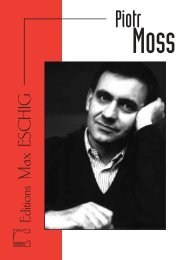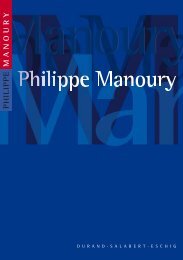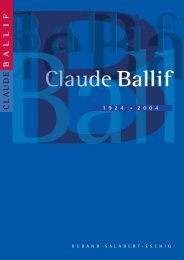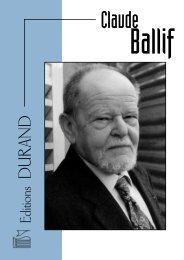messiaen olivier 1 9 0 8 - Durand Salabert Eschig
messiaen olivier 1 9 0 8 - Durand Salabert Eschig
messiaen olivier 1 9 0 8 - Durand Salabert Eschig
Create successful ePaper yourself
Turn your PDF publications into a flip-book with our unique Google optimized e-Paper software.
Le cycle de six mélodies Chants de Terre et de Ciel (1938) semble être le jumeau de<br />
Poèmes pour Mi, tant les ressemblances sont frappantes : une identique densité<br />
d’écriture, notamment rythmique ; une destination à la même interprète, le « grand<br />
soprano dramatique » Marcelle Bunlet ; enfin, des poésies, bien entendu toujours écrites<br />
par le compositeur, qui prolongent ses méditations sur le mariage et l’amour entre un<br />
homme et une femme (ne s’agit-il pas d’un des jalons de sa sempiternelle passion pour<br />
le mythe de Tristan et Yseult ?). Ces méditations entrecroisent quatre thématiques bien<br />
tracées : l’amour humain, entre une femme et un homme ; le double amour, celui,<br />
inaltérable, de Dieu envers chaque être humain, et, celui, toujours limité, de l’homme<br />
vers Dieu ; la crainte coupable du tort fait à Dieu par l’homme ; et la mort rédemptrice<br />
par laquelle l’âme se fond en Dieu. Dans Chants de Terre et de Ciel, Messiaen ajouta une<br />
cinquième thématique : l’arrivée de l’enfant.<br />
On le constate, Olivier Messiaen reprit à son compte le chemin dont son aîné et ami,<br />
Darius Milhaud avait déjà montré la voie avec Alissa, écrit en 1913 : non plus la mélodie<br />
française – fragile et destinée aux « salons » – ou la cantate de chambre, mais le monodrame<br />
selon Schönberg, avec Erwartung (L’Attente) ou Das Buch der hängenden Gärten<br />
(Le Livre des Jardins suspendus). Avec leurs œuvres mélodiques d’une ampleur sans<br />
précédent, ces trois compositeurs conçurent une bouleversante dramaturgie de l’intime,<br />
non en une vulgaire projection théâtrale mais en une quête de l’identité humaine au-delà<br />
de la subjectivité immédiate.<br />
Ainsi ces œuvres traversent-elles l’histoire, loin de tout aspect anecdotique.<br />
The six-song cycle Chants de Terre et de Ciel (1938) is so strikingly similar to Poèmes<br />
pour Mi that it can be seen as its twin: its writing is equally dense, particularly in its<br />
rhythms, and it was written for the same interpreter, the “great dramatic soprano”<br />
Marcelle Brunet. And the poems – again written by the composer, of course – continue<br />
his meditations on marriage and the love between a man and a woman (perhaps another<br />
mark of his undying passion for the myth of Tristan and Isolde?). Messiaen’s meditations<br />
interlace four well-traced themes: human love between a man and a woman; the duality<br />
of God’s unchanging love toward every human being and the love – always limited – of<br />
man towards God; man’s guilty fear of doing wrong towards God; and redeeming death,<br />
by which the soul merges with God. In Chants de Terre et de Ciel Messiaen adds a fifth<br />
theme: the birth of a child.<br />
Clearly, Olivier Messiaen is following the path that his older colleague and friend<br />
Darius Milhaud had taken with his Alissa, written in 1913: turning away from the fragile,<br />
salon-music style of the French mélodie or the chamber cantata, and towards<br />
Schoenbergian monodrama, as in Erwartung and Das Buch der hängenden Gärten.<br />
In the unprecedented scale of their melodic works, these three composers devised a deeply<br />
moving yet intimate dramatic art, not as a mere theatrical projection, but as a quest for<br />
human identity beyond immediate subjectivity.<br />
37


